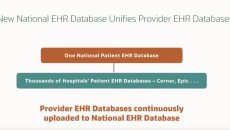Mike Miliard
Meanwhile, HHS publishes guidance on "strengthening cyber posture" but healthcare organizations are asking for more government help managing their security challenges.
From wearables to new machine learning applications, advanced technologies can help improve the inpatient experience, says Rebecca Pinn of EPAM Continuum.
Designed in collaboration with Luma Health, the platform aims to improve the care experience and boost satisfaction for patients – and help providers increase appointment-based revenue.
The coordinating entity for TEFCA has released new details on Exchange Purposes, Individual Access Services Provider Privacy and Security Notice and Practices.
The EHR giant says its 2,000 hospitals and 45,000 clinics will now have the ability to participate in the nationwide interoperability framework developed by ONC and the Sequoia Project.
That should be a "wake-up call to C-level executives," says an exec from Saviynt, which sponsored the survey, since it "fuels the risk of rising identity and access-related attacks and their financial consequences."
The guidance is meant to help providers better understand the privacy and security implications of non-video virtual care options, which are hugely useful for individuals with disabilities and those in rural communities.
Becton, Dickinson and Company will gain access to de-identified real-world evidence from Mayo Clinic Platform_Discover, using AI for insights into medical device safety and security in order to streamline its regulatory submissions.
With the Cerner acquisition now complete, Oracle's co-founder and CTO says his company will build a national EHR database to address interoperability challenges for patients, providers and public health agencies.
Citing a "lack of currently available automated solutions," the hospital group says its members will have difficulty with data exchange between convening providers and co-providers.










